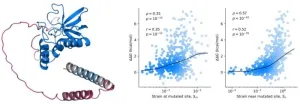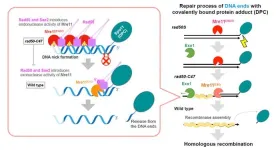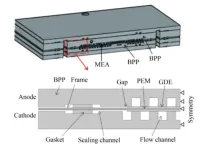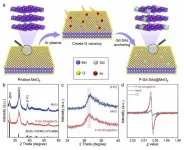(Press-News.org) By Jerry Grillo
The soundtrack of this story begins with a vaguely recognizable and pleasant groove. But if I stop writing and just listen for a second, the music reveals itself completely. In Freddie Hubbard’s comfortable, lilting trumpet solo over Herbie Hancock’s melodic, repetitive piano vamping, I recognize “Cantaloupe Island.” Then, with my fingers again poised at the keyboard, Freddie and Herbie fade into the background, followed by other instrumental music: captivating — but not distracting — sonic nutrition, feeding my concentration and productivity.
Somewhere, I think, Yiren Ren is studying, focused on her research that demonstrates how music impacts learning and memory. Possibly, she’s listening to Norah Jones, or another musician she’s comfortable with. Because that’s how it works: The music we know and might love, music that feels predictable or even safe — that music can help us study and learn. Meanwhile, Ren has also discovered, other kinds of music can influence our emotions and reshape old memories.
Ren, a sixth-year Ph.D. student in Georgia Tech’s School of Psychology, explores these concepts as the lead author of two new research papers in the journals PLOS One and Cognitive, Affective, & Behavioral Neuroscience (CABN).
“These studies are connected because they both explore innovative applications of music in memory modulation, offering insights for both every day and clinical use,” says Ren.
But the collective research explores music’s impacts in very different ways, explains Ren’s faculty advisor and co-author of the study, Thackery Brown.
“One paper looks at how music changes the quality of your memory when you’re first forming it — it’s about learning,” says Brown, a cognitive neuroscientist who runs the MAP (Memory, Affect, and Planning) Lab at Tech. “But the other study focuses on memories we already have and asks if we can change the emotions attached to them using music.”
Making Moods With Music
When we watch a movie with a robust score — music created to induce emotions — what we’re hearing guides us exactly where the composer wants us to go. In their CABN study, Ren, Brown, and their collaborators from the University of Colorado (including former Georgia Tech Assistant Professor Grace Leslie) report that this kind of “mood music” can also be powerful enough to change how we remember our past.
Their study included 44 Georgia Tech students who listened to film soundtracks while recalling a difficult memory. Ren is quick to point out that this was not a clinical trial, so these participants were not identified as people suffering from mood disorders: “We wanted to start off with a random group of people and see if music has the power to modulate the emotional level of their memories.”
Turns out, it does. The participants listened to movie soundtracks and incorporated new emotions into their memories that matched the mood of the music. And the effect was lasting. A day later, when the participants recalled these same memories — but without musical accompaniment — their emotional tone still matched the tone of the music played the day before.
The researchers could watch all this happening with fMRI (functional magnetic resonance imaging). They could see the altered brain activity in the study participants, the increased connectivity between the amygdala, where emotions are processed, and other areas of the brain associated with memory and integrating information.
“This sheds light on the malleability of memory in response to music, and the powerful role music can play in altering our existing memories,” says Ren.
Ren is herself a multi-instrumentalist who originally planned on being a professional musician. As an undergraduate at Boston University, she pursued a dual major in film production and sound design, and psychology.
She found a way to combine her interests in music and neuroscience and is interested in how music therapy can be designed to help people with mood disorders like post-traumatic stress disorder (PTSD) or depression, “particularly in cases where someone might overexaggerate the negative components of a memory,” Ren says.
There is no time machine that will allow us to go back and insert happy music into the mix while a bad event is happening and a memory is being formed, “but we can retrieve old memories while listening to affective music,” says Brown. “And perhaps we can help people shift their feelings and reshape the emotional tone attached to certain memories.”
Embracing the Familiar
The second study asks a couple of old questions: Should we listen to music while we work or study? And if so, are there more beneficial types of music than others? The answer to both questions might lie, at least partially, within the expansive parameters of personal taste. But even so, there are limits.
Think back to my description of “Cantaloupe Island” at the beginning of this story and how a familiar old jazz standard helped keep this writer’s brain and fingers moving. In the same way, Norah Jones helps Ren when she’s working on new research around music and memory. But if, for some reason, I wanted to test my concentration, I’d play a different kind of jazz, maybe 1950s bebop with its frenetic pace and off-center tone, or possibly a chorus of screeching cats. Same effect. It would demand my attention, and no work would get done.
For this study, Ren combined her gifts as a musician and composer with her research interests in examining whether music can improve — or impair — our ability to learn or remember new information. “We wanted to probe music’s potential as a mnemonic device that helps us remember information more easily,” she says. (An example of a mnemonic device is “Every Good Boy Does Fine,” which stands for E-G-B-D-F and helps new piano players learn the order of notes on a keyboard.)
This study’s 48 participants were asked to learn sequences of abstract shapes while listening to different types of music. Ren played a piece of music, in a traditional or familiar pattern of tone, rhythm, and melody. She then played the exact same set of notes, but out of order, giving the piece an atonal structure.
When they listened to familiar, predictable music, participants learned and remembered the sequences of shapes quicker as their brains created a structured framework, or scaffold, for the new information. Meanwhile, music that was familiar but irregular (think of this writer and the bebop example) made it harder for participants to learn.
“Depending its familiarity and structure, music can help or hinder our memory,” says Ren, who wants to deepen her focus on the neural mechanisms through which music influences human behavior.
She plans to finish her Ph.D. studies this December and is seeking postdoctoral research positions that will allow her to continue the work she’s started at Georgia Tech. Building on that, Ren wants to develop music-based therapies for conditions like depression or PTSD, while also exploring new rehabilitation strategies for aging populations and individuals with dementia.
“These early studies reveal that music can both help and hinder our memory, depending on its familiarity and structure,” Ren says. “I’m excited to bring together my lifelong love of music with my interest in human memory. Because I think the next phase of my research could provide valuable evidence to support the development of music-based interventions for mental health and cognitive function.”
New Study Suggests Music Can Impact Memory - VIDEO
Citation: Yiren Ren, Sophia Kaltsouni Mehdizadeh, Grace Leslie, Thackery Brown. “Affective music during episodic memory recollection modulates subsequent false emotional memory traces: an fMRI study.” Cognitive, Affective, & Behavioral Neuroscience (June 2024).
doi.org/10.3758/s13415-024-01200-0
Citation: Yiren Ren, Grace Leslie, Thackery Brown. “Visual Sequence Encoding is Modulated by Music Schematic Structure and Familiarity.” PLOS One (August 2024).
doi.org/10.1371/journal.pone.0306271
Note: The researchers and storytelling team would like to thank both the School of Music and the Georgia State/Georgia Tech Center for Advanced Brain Imaging for the use of their facilities to make the video and capture images.
Media Contact: Shelley Wunder-Smith | shelley.wunder-smith@research.gatech.edu
Video: Christopher McKenney
END
Georgia Tech neuroscientists explore the intersection of music and memory
Researchers demonstrate music’s impact on learning and memory, with possible therapeutic applications for mental health.
2024-08-29
ELSE PRESS RELEASES FROM THIS DATE:
Waging war on ‘superbugs’ in aged care
2024-08-29
There’s an urgent need for more careful antibiotic management to protect older people living in residential aged care from the dangerous spread of antibiotic resistant bacteria or ‘superbugs’, researchers from Flinders University and SAHMRI warn.
A new study published in the well-respected Journal of Infection, explores the link between the widespread use of antibiotics in residential aged care and the resulting antibiotic resistant bacteria in the gut that can be passed on to other residents.
“Commonly ...
Increasing risk of synthetic opioid drug overdoses in Australia
2024-08-29
A recent study has uncovered alarming insights into the dangers posed by fentanyl-contaminated drug supplies in Australia, including a heightened risk of lethal overdose.
The study, titled ‘The gear could be cut with fentanyl which is starting to happen more in Australia’: Exploring Overdose Survivors’ Perspectives on Toxic Supply and Safe Consumption, aimed to explore the role of synthetic opioids in overdoses among Queenslanders.
Led by Griffith University’s Dr Timothy Piatkowski, Emma Kill and Steph Reeve in partnership with the Queensland ...
Protein mutant stability can be inferred from AI-predicted structures
2024-08-29
Researchers at the Center for Algorithmic and Robotized Synthesis within the Institute for Basic Science have taken a significant step forward in understanding the stability of proteins by leveraging the power of AI. The research team used AlphaFold2 to explore how mutations affect protein stability—a crucial factor in ensuring proteins function correctly and do not cause diseases like Alzheimer's.
DeepMind’s AlphaFold algorithm, which can accurately predict a protein’s structure from ...
Shedding light on the mechanism of yeast DNA repair
2024-08-29
DNA damage is a cellular phenomenon that introduces structural abnormalities in double-stranded DNA. External factors, such as radiation or chemical agents, as well as internal factors, such as blocked DNA replication, can generate double-strand breaks (DSBs) in DNA. To counteract DNA damage, cells engage in DNA repair to preserve genetic integrity and ensure cell survival as failure to repair DSBs has serious health complications like increased risk of cancer.
DSBs are repaired by two mechanisms called non-homologous end joining (NHEJ) and homologous recombination (HR). NHEJ is the predominant DNA repair mechanism in human somatic cells and is ...
Improvement of durability of membrane electrode assembly by frame sealing structure in temperature shock
2024-08-29
Fuel cells offer a promising solution for clean energy with advantages over traditional electric power systems, including extended driving range and higher energy density. Despite these benefits, the high costs and durability concerns associated with fuel cell stacks have limited their commercialization. The durability of membrane electrode assemblies (MEAs), a key component of proton exchange membrane fuel cells (PEMFCs), is particularly affected by the frame sealing structure, which is often overlooked in research.
The study, conducted by Tiankuo Chu ...
Rare earth single atoms enhance manganese oxide's electrochemical oxygen evolution
2024-08-29
An international group of researchers has developed a novel approach that enhances the efficiency of the oxygen evolution reaction (OER), a key process in renewable energy technologies. By introducing rare earth single atoms into manganese oxide (MnO2), the group successfully modulated oxygen electronic states, leading to unprecedented improvements in OER performance.
Their findings were published in the journal Nano Energy on June 10, 2024.
Transition-metal-based oxides have been widely explored for their potential as active OER catalysts. However, the capacity of these catalysts is hindered by the adsorbate evolution mechanism, which ...
Gria: An efficient deterministic concurrency control protocol
2024-08-29
The concurrency control in deterministic databases, i.e., deterministic concurrency control, ensures that each transaction batch produces a unique result. In this way, replicas can process transactions in batches without communicating with each other to ensure consistency, which is simpler and more efficient than non-deterministic databases in achieving high availability through replication.
Early deterministic concurrency control protocols, e.g. Calvin, Bohm, PWV, rely on the prior knowledge of the read-write set, which is impractical in most scenarios. The state-of-the-art Ari breaks this limitation. However, Aria has three issues. First, ...
NSF grants $22 million for 'extreme microbe' lab collaboration
2024-08-29
The National Science Foundation has announced a $22 million grant to establish a “BioFoundry” laboratory for the study of extreme microorganisms with collaborating facilities at UC Riverside, UC Santa Barbara, and Cal Poly Pomona.
The BioFoundry for Extreme and Exceptional Fungi, Archaea, and Bacteria, or ExFAB, will focus on developing techniques to learn from nature’s more unusual microorganisms. These microbes are considered “extreme” because they have unusual nutritional requirements, grow at extremely high or low temperatures, or grow without ...
UC Santa Barbara to lead $22M NSF-funded center on exceptional microbes
2024-08-29
(Santa Barbara, Calif.) — This week, the National Science Foundation announced the award of a six-year, $22M grant to UC Santa Barbara under its biofoundries program for the establishment of the BioFoundry for Extreme and Exceptional Fungi, Archaea and Bacteria (ExFAB), a collaboration led by UC Santa Barbara (UCSB), together with UC Riverside (UCR), and Cal Poly Pomona (CPP). ExFAB establishes the nation’s first biofoundry that focuses on largely untapped and unexplored extreme microbes. UCSB's award is one of only five grants made under NSF's BioFoundry program during this funding cycle, which awarded ...
Misconceptions about dyslexia among professionals risk children being misdiagnosed
2024-08-29
Misconceptions about dyslexia are held by professionals who assess children for the learning difficulty, according to a new study which calls for evidence-based standardised assessment procedures.
The research, led by Durham University, found that almost half of dyslexia professionals in the study believed at least one unproven indicator for dyslexia, which could lead to children being misdiagnosed.
In a survey of 275 dyslexia professionals, the most common myth – which is not backed up by solid evidence – was that people with dyslexia read letters in reverse order, believed by 61 per cent of specialists.
Just over 30 per cent of professionals also ...
LAST 30 PRESS RELEASES:
Kidney cancer study finds belzutifan plus pembrolizumab post-surgery helps patients at high risk for relapse stay cancer-free longer
Alkali cation effects in electrochemical carbon dioxide reduction
Test platforms for charging wireless cars now fit on a bench
$3 million NIH grant funds national study of Medicare Advantage’s benefit expansion into social supports
Amplified Sciences achieves CAP accreditation for cutting-edge diagnostic lab
Fred Hutch announces 12 recipients of the annual Harold M. Weintraub Graduate Student Award
Native forest litter helps rebuild soil life in post-mining landscapes
Mountain soils in arid regions may emit more greenhouse gas as climate shifts, new study finds
Pairing biochar with other soil amendments could unlock stronger gains in soil health
Why do we get a skip in our step when we’re happy? Thank dopamine
UC Irvine scientists uncover cellular mechanism behind muscle repair
Platform to map living brain noninvasively takes next big step
Stress-testing the Cascadia Subduction Zone reveals variability that could impact how earthquakes spread
We may be underestimating the true carbon cost of northern wildfires
Blood test predicts which bladder cancer patients may safely skip surgery
Kennesaw State's Vijay Anand honored as National Academy of Inventors Senior Member
Recovery from whaling reveals the role of age in Humpback reproduction
Can the canny tick help prevent disease like MS and cancer?
Newcomer children show lower rates of emergency department use for non‑urgent conditions, study finds
Cognitive and neuropsychiatric function in former American football players
From trash to climate tech: rubber gloves find new life as carbon capturers materials
A step towards needed treatments for hantaviruses in new molecular map
Boys are more motivated, while girls are more compassionate?
Study identifies opposing roles for IL6 and IL6R in long-term mortality
AI accurately spots medical disorder from privacy-conscious hand images
Transient Pauli blocking for broadband ultrafast optical switching
Political polarization can spur CO2 emissions, stymie climate action
Researchers develop new strategy for improving inverted perovskite solar cells
Yes! The role of YAP and CTGF as potential therapeutic targets for preventing severe liver disease
Pancreatic cancer may begin hiding from the immune system earlier than we thought
[Press-News.org] Georgia Tech neuroscientists explore the intersection of music and memoryResearchers demonstrate music’s impact on learning and memory, with possible therapeutic applications for mental health.







